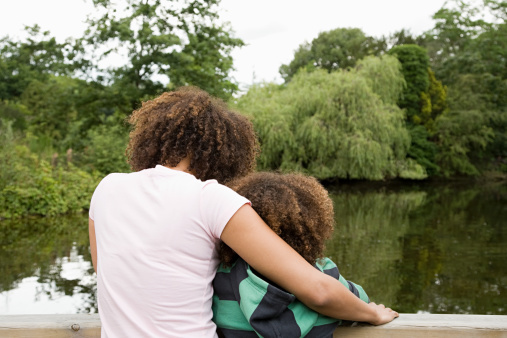And these situations always seem to happen when we’re out and about and our perfect child suddenly becomes like a whirling dervish in front of an assembled crowd.
When our children are older we might look at their more academic or sociable friends and find ourselves, for a horrible moment, comparing. Even if we think we don’t do it – wouldn’t dream of comparing our children – we might realise that we do, in fact, apologise for their behaviour. We might explain our child’s quietness at a social event by saying she’s tired, or urge her to join in when she clearly doesn’t want to.
Or we might flippantly mention how well someone is doing at school to a friend when our less academically-minded child is in earshot. Living in a society that holds academic achievement and social prowess in such high esteem doesn’t help either. If our child falls short on either of these measures of ‘success’, they may feel painfully aware of it.
Expectations of reasonable behaviour are one thing, but putting pressure on our children to be other than they are is a dangerous game. Perhaps your son is quieter than his peers, and prefers his own company. Maybe your daughter is really trying her hardest but finds academia a quagmire of confusion. Sometimes it pays to stop and really take stock of who these beautiful beings we share our lives with truly are, not who we want them to be. When we judge them, what we’re basically saying – even on a subliminal level – is ‘if you changed, I’d love you more’. Children have highly attuned antenna for this kind of judgement. What they require from their parents is what Alfie Kohn in his book of the same name, calls ‘unconditional parenting’. That is, loving our children exactly as they are.
But what about ‘bad behaviour’? If our child is behaving in an unacceptable way – such as hurting another – we are called to find ways to help them process their feelings in a less aggressive way. We also need to remind them that whilst we don’t condone the behaviour, we still love them. That our love for them is a constant, and doesn’t come and go according to their moods. Practises like ‘time out’ which have seen a revival in recent years thanks to TV programs promising to ‘train’ errant children like bad puppies, actually reinforce a child’s sense that our love is conditional. When they are cut off from our love, sitting alone on ‘the naughty step’ to ‘think about’ their behaviour, we are in fact sending a clear message that they are unloveable – we don’t want to be near them.
Though at times our children take us to the absolute reaches of our endurance, loving them is one of our life’s deepest and greatest lessons. Reaching inside for our reserves requires effort we never thought possible before we had children. But a child offered unconditional love flourishes in a sense of constant, pervading safety. Their relationship with their parents is never in question; there is always somewhere for them to retreat to, physically, emotionally and spiritually, when the going gets tough.
Here are five ways in which to love our children just as they are:
1. Never withhold your love as a form of punishment. At a parenting conference I went to, one of the speakers advised doing exactly the opposite of what you feel like doing when your child has thrown a wobbler: sit down with them, get them as close to you as possible by cuddling or simply being near them, talk gently and calmly and offer your love unconditionally. With older children, slow your response down by making a drink and a snack to share with your child before sitting down to talk and use that time to reflect on what’s behind their behaviour. Remind them that whilst what they did wasn’t kind/right/acceptable, you love them just the same. Believe in the best in your children – they’re not inherent monsters waiting for a chance to bite another child, but small people grappling with huge, complicated emotions. The fact that you see their goodness empowers them to believe in it too.
2. If you find yourself apologising for your child’s behaviour, ask yourself if you would do the same if they were your friend. Imagine you’d taken your friend to a party and she wasn’t feeling particularly social; would you excuse her to the assembled company by saying she was tired? Or didn’t eat much of her lunch? Respecting our children as individuals with their own feelings and needs allows them the opportunity to enjoy life on their terms. If you find other people’s response to your child challenging, cut all your energetic cords attaching you to other people and their actual or perceived reactions. Focus your energy entirely on your child, work out what you can do to help them feel their needs are met, and imagine it is just the two of you working as a team.
3. Honour your child’s uniqueness. Perhaps he isn’t like his peers and prefers quietly playing with dolls alone. That’s okay. Just as it’s okay if he loves to charge around and make a lot of noise. Lots of labels have sprung up in recent years to describe different aspects of children’s social development, from Highly Sensitive to High Spirited. Whilst books on these subjects can offer a great deal of solace to a parent raising a child who doesn’t fit within the mainstream (and who does?!), the essence of the idea is the same wherever your child fits on the spectrum of introvert to extrovert – every child is an individual with their own way of approaching the world and everything within it. It is our duty and honour as parents to help them navigate it all in a way most fitting to their personality.
4. Make time to really listen to your child. Discover what makes her soul sing, what makes her laugh out loud, and what she absolutely loathes doing. Respect that sometimes she doesn’t have the words to express these feelings and that they come out in angry, sad or aggressive behaviour. In loving our child at these times, we offer her the opportunity to release some of the tension in a safe and accepting environment, rather than cutting her off when she needs us most.
5. Celebrate your child’s strengths. These might be things he hasn’t even noticed about himself but being seen through loving eyes is incredibly affirming for everyone. Tell him how much you loved seeing him play with the younger children today, or how brave he was climbing that tall tree. Don’t smother your child in praise, particularly in areas where he knows he isn’t as adept, as the praise will ring false to him. Be specific and really focus your attention on him. When you’re with him, pause for a moment and recognise the absolute beauty in this little being – even when they’re driving us up the wall – because they’re driving us up the wall! – our children are a blessing, teaching us more in an hour of their company than we might have learnt in the ten years prior to their arrival.







